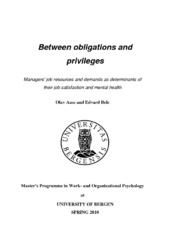Between obligations and privileges: Managers' job resources and demands as determinants of their job satisfaction and mental health
Master thesis
Permanent lenke
https://hdl.handle.net/1956/4010Utgivelsesdato
2010-05-14Metadata
Vis full innførselSamlinger
- Faculty of Psychology [527]
Sammendrag
Based on Bakker and Demerouti's Job Demands-Resources (JD-R) model, the present study hypothesized that the job demands of role conflict, work pace and downsizing, and the job resources of participative decision-making and constructive leadership behaviour, are systematically related to job satisfaction and mental health complaints among a representative sample of Norwegian managers with personnel responsibilities (n=472). Furthermore, in line with the JD-R model, it was hypothesized that the two job resources would act as buffers upon the relationships between the three job demands and the managers' job satisfaction and mental health. Regression analysis revealed that role conflict was positively related to mental health complaints and negatively related to job satisfaction. Moreover, participative decision-making was negatively related to mental health complaints, while positively related to job satisfaction. Constructive leadership behaviour was not systematically related to mental health complaints, but positively related to job satisfaction. In contrast to our hypotheses, neither work pace nor downsizing were significantly related to the two outcomes. Two out of 12 hypothesized buffering effects were confirmed. Participative decision-making buffered the relationship between role conflict and mental health complaints, and between role conflict and job satisfaction. Hence, the importance of efforts aimed at preventing and managing role conflicts and at involving managers in decision-making processes is emphasized. Future research should investigate alternative job demands and job resources in the work situation of managers and apply longitudinal research designs in order to explore casual relationships. Finally, future studies should examine different groups of managers at different organizational levels. Med utgangspunkt i Bakker og Demeroutis Jobbkrav-Ressurs-modell har den foreliggende studien tatt for seg hypoteser om at jobbkravene rollekonflikt, arbeidstakt og nedbemanning, samt jobbressursene deltakende beslutningstakning og konstruktiv lederatferd, er systematisk relatert til jobbtilfredshet og mentale helseplager hos et representativt utvalg av norske ledere med personalansvar (N=472). Videre, i tråd med Jobbkrav-Ressurs-modellen, undersøkte studien hypoteser om at de to jobbressursene ville fungere som buffere av relasjonene mellom de tre jobbkravene og ledernes jobbtilfredshet og mentale helse. Regresjonsanalyse avdekket at rollekonflikt var positivt relatert til mentale helseplager og negativt relatert til jobbtilfredshet. Deltakelse i beslutningstakning var negativt relatert til mentale helseplager, men positivt relatert til jobbtilfredshet. Konstruktiv lederatferd var ikke systematisk relatert til mentale helseplager, men var positivt relatert til jobbtilfredshet. I motsetning til våre hypoteser, så var hverken arbeidstakten eller nedbemanning signifikant relatert til de to utfallsmålene. To av 12 forventede buffereffekter ble avdekket. Deltakende beslutningstakning fungerte som buffer av relasjonene mellom rollekonflikt og mentale helseplager og mellom rollekonflikt og jobbtilfredshet. Fremtidig forskning bør undersøke alternative jobbkrav og jobbressurser i arbeidssituasjonen til ledere, samt anvende longitudinelle forskningsdesign med hensikt å utforske kausale relasjoner. Det oppmuntres også til at nye studier skiller mellom ulike grupper av ledere på ulike organisatoriske nivåer
Utgiver
The University of BergenOpphavsrett
Copyright the author. All rights reservedThe author
